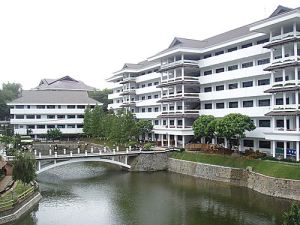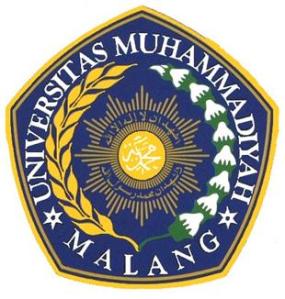
University of Muhammadiyah Malang (UMM) was founded in 1964, on the initiative of the characters and the Regional Leadership of Muhammadiyah Malang. At that time, the University is a branch of Muhammadiyah Malang Muhammadiyah University of Jakarta, which was established by the Foundation of Higher Education of Muhammadiyah Jakarta with a legal letter R. Sihojo Wongsowidjojo in Jakarta 71 dated June 19, 1963 by Gouvernement Besluit No. 81 dated August 22, 1914. At first, University of Muhammadiyah Malang has three (3) faculty, namely (1) Faculty of Economics (2) Faculty of Law, and (3) Faculty of Education and Teaching (FPP) Department of Religious Education. The third faculty get Listed status of the Ministry of Education and Culture, Directorate General of Higher Education in 1966 by Decree No. 68/B- Swt/p/1966 dated December 30, 1966. On 1 July 1968, University of Muhammadiyah Malang became an official university stand-alone (apart from Universitas Muhammadiyah Jakarta) that implementation is in the hands of Muhammadiyah Malang College Foundation, the Notary R. Sudiono, No.. 2, dated July 1, 1968.In the subsequent development of this certificate was renewed by the Notary G. Kamarudzaman 7 dated June 6, 1975, and updated again by the Notary Kumalasari, SH No.026 dated 24 November 1988 and registered at District Court No. Malang. 88/PP/YYS/XI/1988 dated November 28, 1988. In 1968, University of Muhammadiyah Malang add new faculties, namely the Faculty of Social Welfare which is a filial of the Faculty of Social Welfare, University of Muhammadiyah Jakarta. Thus, when the University of Muhammadiyah Malang has had four faculties. In addition, the Faculty of Education and Religious Education Department Pengajran enroll as Religious School under the auspices of the Department of Religion at the Faculty of Tarbiyah name. In 1970 the Faculty of Tarbiyah gain equal status with the university Islamic Studies (IAIN), the Minister of Religious Affairs Decree No. 50 of 1970. This year the Faculty of Social Welfare changed its name to the Faculty of Social Sciences with the Department of Social Welfare. Then in 1975 the School officially stand alone (apart from Universitas Muhammadiyah Jakarta) with Registered Decree No. 022 dated 16 April 1975 A/1/1975.Logo of University of Muhammadiyah Malang
 Faculty
who later opened in 1978 is the name of the Faculty of Engineering
Academy of Engineering Malang and reactivation of the Faculty of
Economics with Bachelor of Education program called the Academy of
Accounting Muhammadiyah (AAM). Opened in 1980 with the Faculty of Agriculture Agriculture Program, then follow the Faculty of Animal Husbandry, 1987. Between 1983 to 2008 opened new faculties and study programs, and increased status. Faculty
is the Faculty of Medicine, which opened in 2001 and the Faculty of
Health Sciences began in 2007 with the founding of Nursing Diploma
course in 1993. The
course is open Medical Education Program, International Relations
Program, Engineering Program Information and Program Studies Pharmacy,
Nursing and Education S1 S1 PGSD. In
1993, University of Muhammadiyah Malang open Postgraduate Master of
Management and Master of Rural Sociology graduate program opened in 1996
Studies Program Islamic Studies, and in 2004 to add three (3) Studies
Program, the Master of Agribusiness, Master of Policy and Development of Education and Master of Law, and in 2006 opened Master of Psychology. Subsequently in 2007 opened the Doctoral Program of Social and Political Sciences. Until
the academic year 2009/2010, UMM has 12 faculties with: ƒ 32
undergraduate programs (S1) ƒ 7 Master degree (S2) ƒ 1 doctoral program
(S3) 3 ƒ diploma (D3) ƒ 4 professional programs. In the span of forty-five years of traveling UMM's (1964-2009) most rapid development began in late 1983. From
that moment onwards UMM recorded very impressive growth, both in the
field of improving the status of the Department, the administrative
reform, the addition of facilities and campus facilities, as well as the
addition and improvement of the quality of managers (administrative and
academic). In
the development of physical infrastructure and academic facilities, is
now available in 3 pieces campus: erjuangan amar preachers and
preaching.
Faculty
who later opened in 1978 is the name of the Faculty of Engineering
Academy of Engineering Malang and reactivation of the Faculty of
Economics with Bachelor of Education program called the Academy of
Accounting Muhammadiyah (AAM). Opened in 1980 with the Faculty of Agriculture Agriculture Program, then follow the Faculty of Animal Husbandry, 1987. Between 1983 to 2008 opened new faculties and study programs, and increased status. Faculty
is the Faculty of Medicine, which opened in 2001 and the Faculty of
Health Sciences began in 2007 with the founding of Nursing Diploma
course in 1993. The
course is open Medical Education Program, International Relations
Program, Engineering Program Information and Program Studies Pharmacy,
Nursing and Education S1 S1 PGSD. In
1993, University of Muhammadiyah Malang open Postgraduate Master of
Management and Master of Rural Sociology graduate program opened in 1996
Studies Program Islamic Studies, and in 2004 to add three (3) Studies
Program, the Master of Agribusiness, Master of Policy and Development of Education and Master of Law, and in 2006 opened Master of Psychology. Subsequently in 2007 opened the Doctoral Program of Social and Political Sciences. Until
the academic year 2009/2010, UMM has 12 faculties with: ƒ 32
undergraduate programs (S1) ƒ 7 Master degree (S2) ƒ 1 doctoral program
(S3) 3 ƒ diploma (D3) ƒ 4 professional programs. In the span of forty-five years of traveling UMM's (1964-2009) most rapid development began in late 1983. From
that moment onwards UMM recorded very impressive growth, both in the
field of improving the status of the Department, the administrative
reform, the addition of facilities and campus facilities, as well as the
addition and improvement of the quality of managers (administrative and
academic). In
the development of physical infrastructure and academic facilities, is
now available in 3 pieces campus: erjuangan amar preachers and
preaching.
Tidak ada komentar:
Posting Komentar